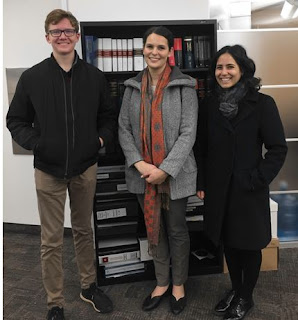The moral of the story is that perspective is everything. The way you think about these negative experiences – in court or otherwise, shape the way you approach every task you do, and that is the most valuable lesson I have learned so far this summer.
Picture your first time attending court for your new job. This is the first assignment you have for a lawyer you greatly respect, and it is a simple task to complete – get a draft order on consent signed. This should not be too hard – right?
You finally find your way to where you should be in a Courthouse you have never been before, that is the first win of the day. Now should be the easy part, you have got all the documents you need, which you know for a fact because you checked eight times before you left.
"You know exactly what to say because the lawyer who assigned this
to you gave you a script – what could go wrong?"
It is your turn to speak. You stand up, say good morning, repeat your script as confidently as you can, and take a sigh of relief afterwards when you did not make a mistake. You did everything you were told and therefore nothing can go wrong. Or can it? Spoiler alert, it definitely will at some point or another.
I stood there bewildered as the Master asked me a plethora of questions. Not only did I simply not have the answers, but I also could not even provide him with an inkling to where we might find the answers. My inner monologue was melting down as I tried to explain that I did not have information to answer the questions, and my instructions included everything I had given to him. In my head, I thought surely this would be enough; he could not be upset for me not having instructions. I was wrong, he definitely could be, and he was.
Let us fast forward through the part of eye rolls, yelling, and a banged fist on the desk. I just kept thinking repeatedly how this could have happened because I followed my instructions exactly.
I get back to the office, and our Student Program Director, Ashley happened to walk by our desks to do her usual check-up on us. She then gave me some of the best advice I have ever gotten. “You have to change your perspective from ‘I hope they don’t yell’ to ‘they are going to yell, and I will not feel bad about it if I did nothing wrong.’”
That was a fundamental change in perspective. Instead of hoping that they will not yell at you, you have to accept that they could just be having a bad day, and taking their frustration out on anyone, and perhaps a student is the easiest. Every time you speak in court and no one yells – that will be an incredible win.
This advice was about more than just somebody yelling at you in Court. What we already know is that negative feedback is a learning experience. Of course, we love it when busy lawyers take time out of their day to tell us that we did a good job on their assignment. They do not always have time to do this, so you might not hear from them at all. What I took away from this conversation with Ashley was quite simply, if there is no negative reaction, you are doing just fine. Now when I hear nothing, that radio silence tells me that what I did was probably fine, and I am probably doing fine. Regardless of what the task is, whether it is speaking in court, drafting a mediation memorandum, a statement of claim or defence, or merely assembling a motion record, if you gave it all your effort and no one comes looking for you to make changes, you are doing a great job.
The pressure to impress can weigh heavy on your mind and can cause a lot of stress, but learning how to read the interactions you do have, is fundamental to managing your own stress. It also never hurts to have a Student Director like Ashley Faust to run to after an experience like this.
P.S. Do yourself a favour, on your first trip to court and wear waterproof mascara.
by Jennifer
P.P.S. from a senior lawyer’s
perspective on Masters ‘schooling’ a student.
It is gratifying to know that some
things never change. Students being grilled by some Masters is a tradition and
part of the development of a litigator. I especially enjoyed being in Masters
motions court when I had a few years under my belt watching a Master school a
student.
Did you read the Rule which is the basis
of the motion?
Do you have the Rules with you today?
Did you read my recent decision in John
Doe v Jane Doe?
Maybe you better call your principal and
suggest he come to court to deal with this.
And all the more seasoned lawyers
smiling as they went on. Eventually, the Student usually obtained the order or
was told what to do to get the order when the Student
returned.























